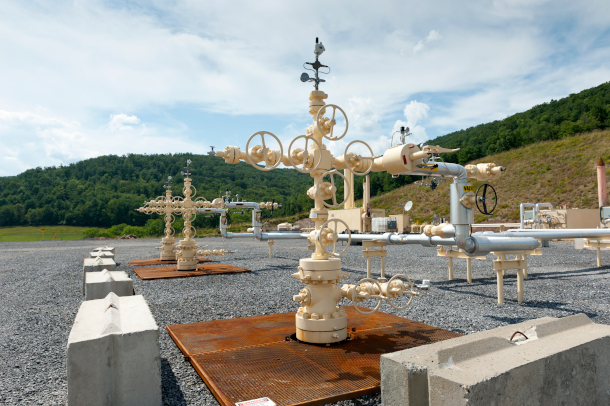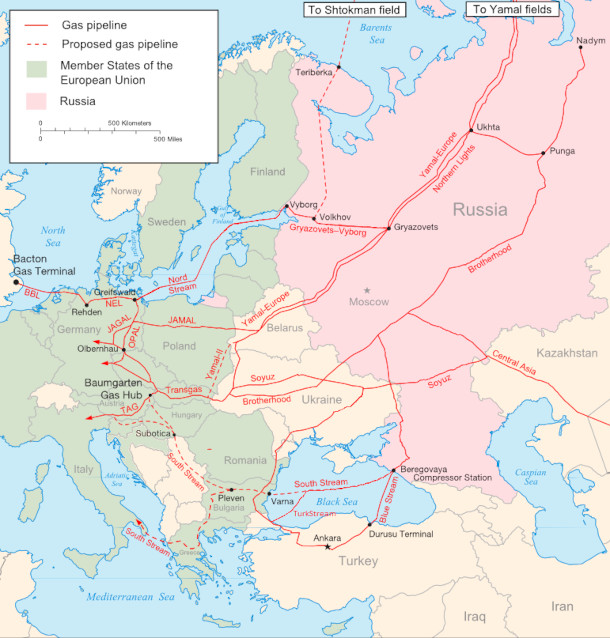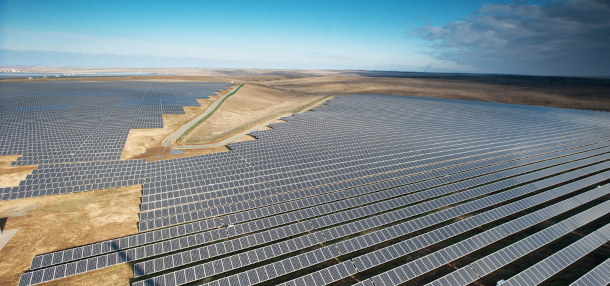Natural Gas for Europe
Air Date: Week of March 25, 2022

Pictured above: three shale gas wells in Pennsylvania. (Photo: Jeremy Buckingham, Flickr, CC BY 2.0)
While the UN Secretary General warns the world not to drill for more fossil fuels, Pennsylvania gas producers are looking to expand and help supply natural gas to Europe in the face of Russia’s attack on Ukraine and tightening energy supplies. The Allegheny Front’s Julie Grant reports on these efforts and the pushback.
Transcript
BASCOMB: From PRX and the Jennifer and Ted Stanley Studios at the University of Massachusetts Boston, this is Living on Earth. I’m Bobby Bascomb.
CURWOOD: And I’m Steve Curwood.
As the Russian invasion of Ukraine has seen world oil and natural gas prices skyrocket, United Nations General Secretary Antonio Guterres is warning that short-term thinking about disrupted fossil fuel supplies could imperil climate safety for all of humanity. He spoke about failures to meet the Paris Climate agreement goal of limiting global temperature rises to 1.5 degrees centigrade, on March 21st at an Economist magazine forum.
GUTERRES: You have kindly invited me to speak on the topic of keeping 1.5 alive. Well, there is no kind way to put it. The 1.5 degree goal is on life support. It is in intensive care.
CURWOOD: In fact, even without the war he said we are already facing disasters.
GUTERRES: In 2020, climate disasters forced 30 million people to flee their homes three times more than those displaced by war and violence.
CURWOOD: Secretary-General Guterres begged nations not to let the quest for fossil fuels escalate into an unwinnable battle against the deadly forces of climate disruption.
GUTERRES: As major economies pursue an all of the above strategy to replace Russia and fossil fuels, short term measures might create long term fossil fuel dependence and close the window to 1.5 degrees. Countries could become so consumed by the immediate fossil fuel supply gap that they neglect or kneecap policies to cut fossil fuel use. And this is madness. Addiction to fossil fuels is mutually assured destruction.
CURWOOD: But with supply gaps created with the Russian-Ukrainian War, fossil fuel producers are already looking to expand production and infrastructure, including those fracking in the Marcellus shale region in Western Pennsylvania. Reporter Julie Grant with the Allegheny Front has more.
GRANT: Europe currently relies on Russia for as much as 40% of its natural gas supply, and that has many people worried that Russia is weaponizing its energy by reducing the flow to Ukraine and in Europe. The Pennsylvania natural gas industry wants to step in.
CALLAGHAN: We see obviously a need in Europe for more energy.
GRANT: David Callaghan is president of the Marcellus Shale Coalition, which represents gas producers in the Appalachian region.
CALLAGHAN: We have the opportunity, we have the means to help supply them with additional supplies of natural gas from the United States.
GRANT: Even before the current conflict, natural gas prices in Europe were at record highs. So US gas production has also been on the rise.

This map depicts major existing and planned natural gas pipelines, supplying Russian gas to the rest of Europe. In 2021, Russia was responsible for 45% of the European Union’s total natural gas imports. (Photo: Samuel Bailey, Wikimedia Commons, CC BY 3.0)
CALLAGHAN: We've seen the rig count tick up a little bit here regionally and nationally. So yes, there is increased activity in response to those price signals, and in response to the crisis as well.
GRANT: The European natural gas market came into this winter in what Dustin Meyer, Vice President of Natural Gas Markets at the American Petroleum Institute calls a bit of a perfect storm. Europe's own gas production was in decline over the last decade. Last year, it experienced a cold winter and then a hot summer and had little energy in reserve.
MEYER: The European natural gas market, even before this conflict began, was already very, very tight. And so this conflict is really happening at the worst possible time for European gas markets. It's a reminder of just how vulnerable and exposed the European continent is to Russia and their dependency on natural gas, specifically.
GRANT: The effort to stabilize Europe's energy sources means additional export business for the US natural gas industry, according to William Ryan, Senior Advisor at the Washington based Center for Strategic and International Studies. He ran the US Export Control Program during the Clinton administration.
RYAN: For gas producers, particularly in the eastern part of the United States, it's a fairly positive outlook, long term.
GRANT: That could be good news for Pennsylvania producers, but ramping up enough production to replace Russian sources and expanding US export capabilities won't happen overnight.
RYAN: This is not like next month. You know, this is something that's going to happen over a period of years.

Climate protection advocates warn against switching out dependence on Russian fossil fuels for another country’s, and instead advocate for Europe to move towards green alternatives, like this solar park in Crimea, Ukraine. (Photo: Activ Solar, Flickr, CC BY-SA 2.0)
GRANT: Oil and Gas groups including the American Petroleum Institute and Pennsylvania's Marcellus Shale Coalition are calling on state and federal leaders to get more approvals for long term projects like pipelines and export terminals. New export capacity already in the works in Louisiana will give the US the largest natural gas export capacity in the world. But environmentalists say it doesn't make sense to invest in large scale infrastructure to support fossil fuels. Rob Altenburg is director of Penn Futures Energy Center.
ALTENBURG: They are contemplating you know hundreds of millions, if not billions of dollars of investment in new infrastructure, from pipelines to LNG export facilities, and all of this largely paid with taxpayer money. These are projects that will take years to complete and will likely never pay for themselves.
GRANT: He points out that in the wake of the Russian aggression, Germany has accelerated plans to move toward 100% renewable energy. It now intends to be free of fossil fuel use in 13 years, at which time it will no longer be clamoring for natural gas.
ALTENBURG: Companies want to build infrastructure that will lock us into this fuel use for decades. And it's not by no means clear that there'll be the markets for decades to come to allow them to do that.
GRANT: Altenburg says given climate change, the only sustainable solution for the US is to follow Europe's lead and rapidly transition to renewable energy generation.
CURWOOD: Reporter Julie Grant’s story comes to us courtesy of the Allegheny Front.
Links
Living on Earth wants to hear from you!
Living on Earth
62 Calef Highway, Suite 212
Lee, NH 03861
Telephone: 617-287-4121
E-mail: comments@loe.org
Newsletter [Click here]
Donate to Living on Earth!
Living on Earth is an independent media program and relies entirely on contributions from listeners and institutions supporting public service. Please donate now to preserve an independent environmental voice.
NewsletterLiving on Earth offers a weekly delivery of the show's rundown to your mailbox. Sign up for our newsletter today!
 Sailors For The Sea: Be the change you want to sea.
Sailors For The Sea: Be the change you want to sea.
 The Grantham Foundation for the Protection of the Environment: Committed to protecting and improving the health of the global environment.
The Grantham Foundation for the Protection of the Environment: Committed to protecting and improving the health of the global environment.
 Contribute to Living on Earth and receive, as our gift to you, an archival print of one of Mark Seth Lender's extraordinary wildlife photographs. Follow the link to see Mark's current collection of photographs.
Contribute to Living on Earth and receive, as our gift to you, an archival print of one of Mark Seth Lender's extraordinary wildlife photographs. Follow the link to see Mark's current collection of photographs.
 Buy a signed copy of Mark Seth Lender's book Smeagull the Seagull & support Living on Earth
Buy a signed copy of Mark Seth Lender's book Smeagull the Seagull & support Living on Earth

